<< Previous | Displaying results 6626-6649 of 6720 for "" | Next >>
-
Geography of the Holocaust
Media EssayThe Holocaust (1933–1945) was the systematic, state-sponsored persecution and murder of six million European Jews by the Nazi German regime and its allies and collaborators. The Holocaust era began in January 1933 when Adolf Hitler and the Nazi Party came to power in Germany. It ended in May 1945, when the Allied Powers defeated Nazi Germany in World War II. The Holocaust was a German initiative that took place throughout German- and Axis-controlled Europe. It affected nearly all of Europe’s Jewish…
-
D-Day
ArticleThe D-Day invasion was the largest amphibious attack in history. Read articles and browse photos and videos of Allied forces invading Normandy on June 6, 1944.
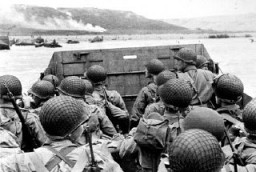
-
General Dwight D. Eisenhower with paratroopers of the 101st Airborne Division
PhotoGeneral Dwight D. Eisenhower visits with paratroopers of the 101st Airborne Division just hours before their jump into German-occupied France (D-Day). June 5, 1944.
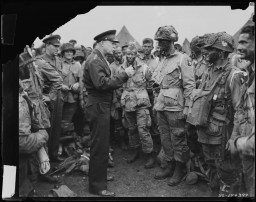
-
Zimbabwe: Overview
ArticleZimbabwe has experienced multiple episodes of mass atrocities since 1980. One of the most severe was the Gukurahundi massacres (1983-1987). Learn more.
-
Adolf Hitler greets Reich Bishop Ludwig Mueller
PhotoAdolf Hitler greets Reich Bishop Ludwig Mueller at a Nazi Party Congress. Roman Catholic Abbot Alban Schachleiter stands between Hitler and Mueller. Nuremberg, Germany, September 1934.
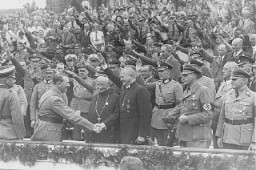
-
Jewish women and girls wearing the compulsory badge
PhotoJewish women and girls wearing the compulsory badge. Vienna, Austria, 1941.
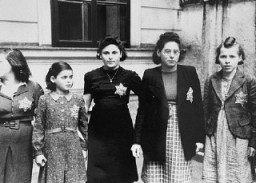
-
Sigmund and Anna Freud in Paris
PhotoSigmund Freud and daughter Anna in Paris, en route to exile in England. June 1938.
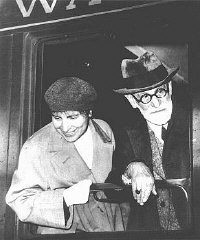
-
Survivors of a death march
PhotoTwo emaciated female Jewish survivors of a death march lie in an American military field hospital in Volary, Czechoslovakia. Pictured on the left is seventeen-year-old Nadzi Rypsztajn.The original caption reads "This girl, only seventeen years old, was forced to march 18 miles a day for 30 days on one bowl of soup a day. The 5th Infantry Division of the U.S. Third Army found 150 in the same condition when they entered Volary, Czechoslovakia."
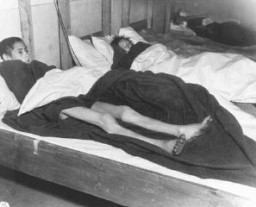
-
Preparing to bury the victims of a death march
PhotoA Hungarian Jewish youth identifies the body of his father, who was shot by the SS during a death march from Flossenbürg. Members of the US military prepare the victims' burial. Neunburg, Germany, April 25, 1945.
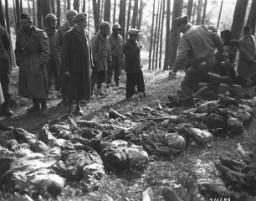
-
Hitler Youth members at a Nazi rally
PhotoHitler Youth members listen to a speech by Adolf Hitler at a Nazi "party day" rally. Nuremberg, Germany, September 11, 1935.
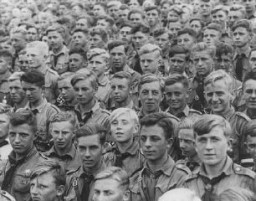
-
A building burns during the suppression of the Warsaw ghetto uprising
PhotoA building burns during the suppression of the Warsaw ghetto uprising. The photograph was taken through the window of a building adjacent to the ghetto. Warsaw, Poland, May 1943.
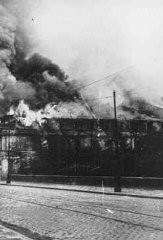
-
St. Louis passengers wait to hear if they can enter Cuba
PhotoPassengers on the St. Louis wait to hear whether the Cuban government will permit them to land. Havana, Cuba, between May 27 and June 2, 1939.
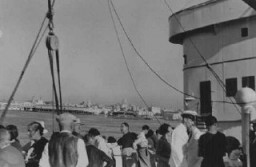
-
A girl in the Kloster Indersdorf children's center
PhotoSofia Karpuk holds a name card intended to help any of her surviving family members locate her at the Kloster Indersdorf displaced persons camp. This photograph was published in newspapers to facilitate reuniting the family. Kloster Indersdorf, Germany, October-November 1945.
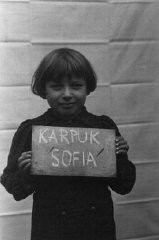
-
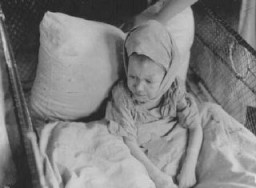
-
A Jewish wedding in Morocco
PhotoJewish wedding in Morocco, 1942. Photo: US Holocaust Memorial Museum, courtesy of YIVO Institute for Jewish Research
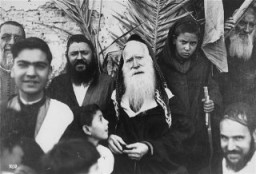
-
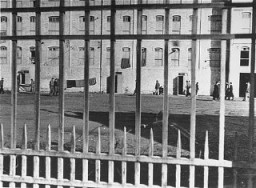
-
Malmedy war crimes trial verdict
PhotoA crowd waits outside the American military court for the announcement of a verdict in the Malmedy war crimes trial of SS soldiers accused of taking part in the massacre of American prisoners of war. Dachau, Germany, July 16, 1946.

-
Stroop Report cover
ArtifactSS Major General Juergen Stroop, commander of German forces that suppressed the Warsaw ghetto uprising, compiled an album of photographs and other materials. This album, later known as "The Stroop Report," was introduced as evidence at the International Military Tribunal at Nuremberg. Here, its cover is marked with an IMT evidence stamp.
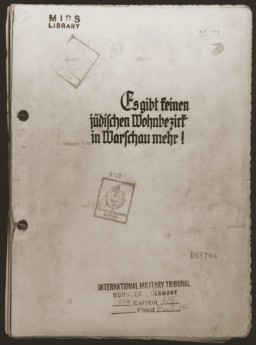
-
Transnistria Governorate
ArticleThe Transnistria Governorate was established in occupied Soviet Ukraine during WWII. Learn more about the Holocaust in Transnistria between 1941-1944.
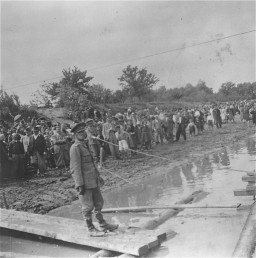
-
Watercolor painting by Simon Jeruchim entitled "Memory of June 6, 1944"
PhotoTeenager Simon Jeruchim learned of the Allied invasion of German-occupied France (D-Day) on a shortwave radio. He painted a watercolor depiction of the bombing and burning of a town situated on a river. He titled the piece "Memory of June 6, 1944." Simon Jeruchim was born in Paris in 1929 to Samuel and Sonia (née Szpiro), Jewish émigrés from Poland. In July 1942, Simon’s parents were able to find hiding places for him and his siblings, but they were arrested and deported to Auschwitz before they…
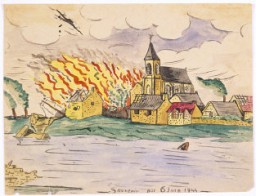
-
US troops pull the survivors ashore on D-Day
PhotoUS troops pull the survivors of a sunken craft onto the shores of the Normandy beaches on D-Day. Normandy, France, June 6, 1944.
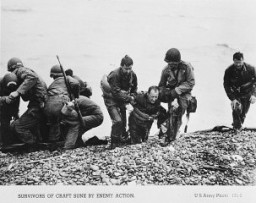
-
St. Louis arrives in Antwerp
PhotoThe St. Louis, carrying Jewish refugees from Nazi Germany, arrives in the port of Antwerp after Cuba and the United States denied it landing. Belgium, June 17, 1939.
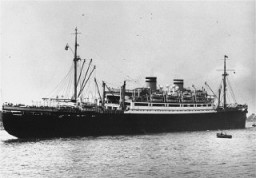
-
World War I: Aftermath
ArticleThe trauma of WWI would profoundly shape the attitudes and actions of leaders and ordinary people during the Holocaust. Learn more about the aftermath of the conflict.

-
The Nazi Rise to Power
ArticleThe Nazi Party was one of a number of right-wing extremist political groups that emerged in Germany following World War I. Learn about the Nazi rise to power.

